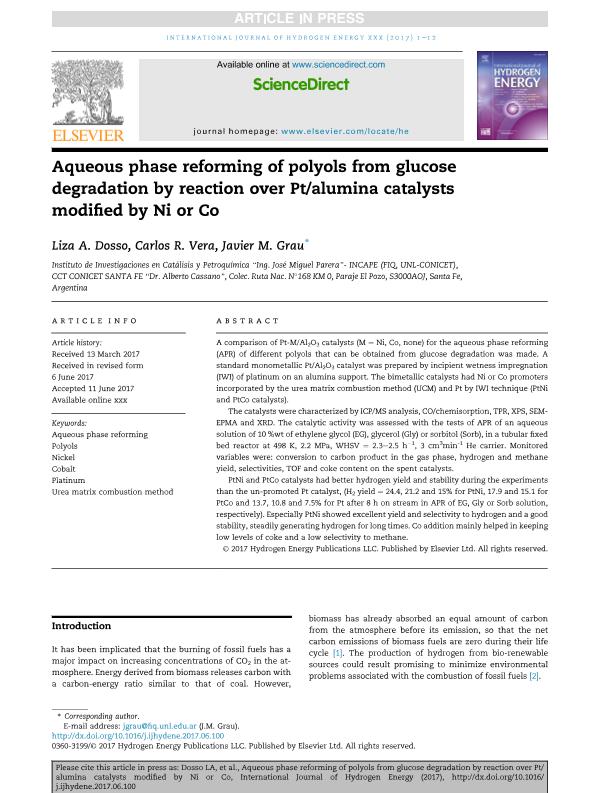Artículo
Aqueous phase reforming of polyols from glucose degradation by reaction over Pt/alumina catalysts modified by Ni or Co
Fecha de publicación:
07/2017
Editorial:
Elsevier Science Inc
Revista:
International Journal of Hydrogen Energy
ISSN:
0360-3199
Idioma:
Inglés
Tipo de recurso:
Artículo publicado
Clasificación temática:
Resumen
A comparison of Pt-M/Al2O3 catalysts (M = Ni, Co, none) for the aqueous phase reforming (APR) of different polyols that can be obtained from glucose degradation was made. A standard monometallic Pt/Al2O3 catalyst was prepared by incipient wetness impregnation (IWI) of platinum on an alumina support. The bimetallic catalysts had Ni or Co promoters incorporated by the urea matrix combustion method (UCM) and Pt by IWI technique (PtNi and PtCo catalysts).The catalysts were characterized by ICP/MS analysis, CO/chemisorption, TPR, XPS, SEM-EPMA and XRD. The catalytic activity was assessed with the tests of APR of an aqueous solution of 10 %wt of ethylene glycol (EG), glycerol (Gly) or sorbitol (Sorb), in a tubular fixed bed reactor at 498 K, 2.2 MPa, WHSV = 2.3-2.5 h-1, 3 cm3min-1 He carrier. Monitored variables were: conversion to carbon product in the gas phase, hydrogen and methane yield, selectivities, TOF and coke content on the spent catalysts.PtNi and PtCo catalysts had better hydrogen yield and stability during the experiments than the un-promoted Pt catalyst, (H2 yield = 24.4, 21.2 and 15% for PtNi, 17.9 and 15.1 for PtCo and 13.7, 10.8 and 7.5% for Pt after 8 h on stream in APR of EG, Gly or Sorb solution, respectively). Especially PtNi showed excellent yield and selectivity to hydrogen and a good stability, steadily generating hydrogen for long times. Co addition mainly helped in keeping low levels of coke and a low selectivity to methane.
Archivos asociados
Licencia
Identificadores
Colecciones
Articulos(INCAPE)
Articulos de INST.DE INVEST.EN CATALISIS Y PETROQUIMICA "ING. JOSE MIGUEL PARERA"
Articulos de INST.DE INVEST.EN CATALISIS Y PETROQUIMICA "ING. JOSE MIGUEL PARERA"
Citación
Dosso, Liza Ainalen; Vera, Carlos Roman; Grau, Javier Mario; Aqueous phase reforming of polyols from glucose degradation by reaction over Pt/alumina catalysts modified by Ni or Co; Elsevier Science Inc; International Journal of Hydrogen Energy; 42; 30; 7-2017; 18853-18864
Compartir
Altmétricas




